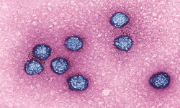Pathogen and transmission
Tick-borne encephalitis or TBE (‘encephalitis’ means an inflammation of the brain) is an infectious disease that is caused by the TBE virus. The virus is transmitted through the bite of an already infected castor bean tick.
Castor bean ticks primarily live in deciduous forests and woods with extensive undergrowth, and are found throughout Switzerland at elevations of up to around 2,000 metres above sea level. They feed on animal and human blood, and can transmit any of various pathogens when they bite their food source. In addition to tick-borne encephalitis (TBE), castor bean ticks can transmit Lyme disease or the much rarer ehrlichiosis or rickettsiosis. While TBE is caused by a virus, the other three are bacterial infections. The ehrlichiosis and rickettsiosis bacteria come in several variants which can each result in their own symptoms and pathologies.
Pathology
Seven to 14 days after being bitten by an infected tick, an individual may notice the first signs of TBE in the form of flu-like symptoms. With most TBE patients, however, no such symptoms appear. In 5 to 15 per cent of TBE infections the virus attacks the central nervous system, causing symptoms such as headaches, photophobia (intolerance of light), dizziness, difficulty concentrating and movement impairment. Such symptoms can persist for weeks or months. Some patients also experience paralysis in their arms, legs or facial nerves, and even permanent disability. Around 1 per cent of TBE cases with neurological symptoms end in death. There is no treatment for the cause of TBE: only the symptoms can be treated.
Distribution and frequency of occurrence
TBE is found extensively in Russia and the Far East. And it is spreading in Europe, too. A tangible increase in cases of TBE has been seen in the last few years. This is likely to be for various reasons, including more favourable climatic conditions for castor bean ticks and weather that is encouraging people to spend more time outdoors.
Castor bean ticks can be found all over the world. The areas in Switzerland in which people have been infected with the TBE virus have grown in extent. Only Cantons Geneva and Ticino have remained largely TBE-free. Thus, all of Switzerland with the exception of these two cantons must be regarded as a TBE risk area.
Prevention
A safe and effective TBE vaccine is available. Vaccination is recommended for anyone (generally aged six or over) who lives in a tick risk region (i.e. the whole of Switzerland except Cantons Geneva and Ticino). In addition to this, general anti-tick protection is advised: wearing skin-covering clothing and avoiding undergrowth areas. Tick repellents for the skin and insecticides for clothing are helpful, too.
Since tick bites often go unnoticed, you should always check for ticks on your skin or clothing after any time spent in wooded or forested areas. Wearing light-coloured clothing will make it easier to see any ticks present. Pets such as dogs, cats or horses should be examined for ticks, too. If you find a tick, remove it without delay. The best way to do so is by grasping it with tweezers as close to your skin as possible and pulling it slowly and steadily out. Once you have removed the tick, disinfect the bite area. If you develop a fever or other symptoms following a tick bite, see a doctor.


